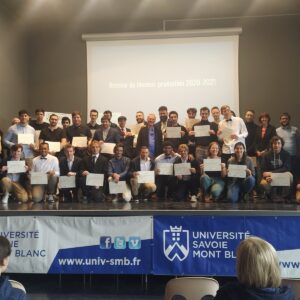Training courses
Computing license
Visit computing license provides the scientific and technical skills needed to develop digital applications. This bachelor's degree covers the fundamentals of computer science (algorithms, data structures, operating systems) as well as software engineering (programming, databases, project management, etc.).
Master of Computer Science
Visit master in computer science enables students with a bachelor's degree in computer science to acquire knowledge and develop high-level skills in general computing for engineering professions.
This academics covers a relatively broad spectrum, with particular emphasis on software engineering (software systems design, software architectures and quality), interaction models (parallelism, distributed applications and systems, service-oriented architectures), as well as the foundations of computer science (algorithms, formal methods, generic programming) and Artificial Intelligence (machine learning, data mining, semantic web).
CMI Computer Science
The CMI (Cursus Master en Ingénierie - Master's Degree in Engineering) is a reinforced academics Bachelor's-Master's degree, coherent over 5 years, leading to engineering positions and built on the international Master of Engineering model. Its implementation is subject to approval by the national network. Figure.
The aim of the CMI Computer Science is to train engineering experts, specialized in IT, with the personal and professional skills required for the engineering profession: autonomy, adaptability, scalability, integration skills and teamwork.
Learn more about Computer Science at UFR SceM
Project-based teaching
Project-based learning is encouraged. Indeed, producing software for a company or association enables students to grasp the different aspects of the software life cycle, from the acquisition of requirements to delivery. Agile methods are covered, as well as human management, customer focus and tools to facilitate collaborative development.
Internships and work-study programs
The internship is compulsory at the end of the first year of the Master's program. It lasts a minimum of 2 months and a maximum of 4 months. The student receives compensation.
The second year of the Master's program is mainly a sandwich course under an apprenticeship contract. The student is employed by a company. They receive a salary throughout the year, and complete their course in the following rhythm: 2 weeks at school / 2 weeks at the company.
Year abroad
Students can spend the 3rd year of their bachelor's degree or the 1st year of their master's degree in a foreign partner institution: Ireland, Italy, Spain, Romania, etc.
Designer / Developer
Based on the analysis of user needs and the functional study, the developer will take part in the detailed specification phase, and implement the solution using the chosen technologies, while respecting deadlines and defined quality standards.
Functional analyst
The functional analyst's mission is to design an application functionally. To do this, they must analyze user needs and formalize them before proposing the most appropriate solutions.
IT Project Manager
Reporting to the design director or IT director, the project manager designs, develops, fine-tunes and delivers applications on behalf of a customer.
Information systems architect
The architect designs the various elements of an information system and the way they fit together. They also manage the system's evolution, in line with technological developments and business needs.
Testing and validation
The test and validation analyst carries out test scenarios and records the results, using his or her skills in development, integration and testing platforms and tools. He/she ensures that an application corresponds to the specifications, that it does not damage the information system, and that it can be used on all types of hardware and in all situations.
Contacts :
IT department secretariat: 04 79 75 88 44 - secretariat-dept-info.SceM@univ-smb.fr
IT Department Manager : david.telisson@univ-smb.fr
They talk about the IT department
Video presentation Master of Computer Science
"Following a Baccalauréat S in which I was introduced to programming, I joined the USMB's computer science bachelor's degree program. At academics , I learned all the basics of computer science, with both theoretical and practical aspects. Teamwork is encouraged throughout academics , which I think is a real plus. It also prepares us for more substantial projects, especially in the 2nd and 3rd years. One project I worked on with 4 other students was a multiplayer serious game. It's extremely gratifying to be able to present our work to the customer on a regular basis, and to understand the new ideas it triggers in them. I was then able to continue my studies in the Computer Science Masters program, which enabled me to gradually refine my career path, in particular through the work placement and the various fields studied (web architecture, mobile development, artificial intelligence, etc.). By concluding my studies with a work-study program, I was able to develop and demonstrate my skills by applying them to the problems of a cybersecurity company, which then hired me."
"When you go back to school after working, you enter the classroom with a different outlook. This was my case when I arrived in L3 STIC, in 2016. Behind my classmates who had done L1 and L2, I made rapid progress thanks to the balanced classes and practical work. If, like me, you are willing and passionate, the teaching team will be behind you and will ensure your follow-up throughout academics. Although abstract at first glance, some subjects will end up making sense in your professional career.
More than just technical skills, I acquired an IT culture that enabled me to be effective quickly on any technology. Before the end of my sandwich course, I signed a permanent contract with the company of my choice.
"I enrolled in the STIC INFO program at the University of Savoie to resume my studies in Computer Science. I wanted to train for a job that combined scientific activity, teamwork and practical applications. At the university, I was able to learn the job of developer from attentive teachers. The comprehensive program and the fact that I was part of a group on a human scale enabled me to flourish in my studies and to find an interesting and motivating job as an engineer."
"I did my 2nd and 3rd years of undergraduate studies in Mathematics atUniversité Savoie Mont Blanc. The university then allowed me to change direction and go straight into a 3rd year Computer Science degree. I then went on to study for a Masters in Computer Science. This academics provided me with a wealth of knowledge and skills, both practical and theoretical. It's an excellent preparation for the world of work. In the 1st year of the Master's program, the internship involved a technical and functional study of Google technologies. The 2nd year internship enabled me to join an IOS development team at a Savoy-based company specializing in smartphone software applications. I was taken on as soon as I finished my internship, and I can't see the time passing because I love what I'm doing so much!
Le Dauphiné Libéré - 08/12/2023 - Patrick Ansannay-Alex - Climate change at the 17th Nuit de l'informatique
<em>Le Dauphiné Libéré – 03/12/2022 – Patrick Ansannay-Alex</em> – 88 students take part in Computer Night marathon
<em>Le Dauphiné Libéré – 06/12/2021 – Patrick Ansannay-Alex – </em>An all-night computer marathon for 72 students from theUniversité Savoie Mont Blanc
<em> </em>
Events
These events are organized in collaboration with the association EISPRI-STIC - A student association (BDE) whose aim is to bring together computer science students and their teachers to get to know each other better and create a good atmosphere in the department.
Contact: asso.eispri.stic@gmail.com
On the second Friday in October, academics partner companies present their professions and career opportunities to third-year bachelor's and master's students.
On the second Friday in October, students, alumni and the teaching team meet in a gîte to strengthen cohesion and encourage exchanges between the different classes.
On the first Thursday in December, students organize the Savoy session of the national "Nuit de l'Info" event, which brings together thousands of students from all over France to design and develop an IT project. 
 Last Friday in March, graduation ceremony for the previous year's bachelor's and master's degrees, in the presence of families and teaching staff.
Last Friday in March, graduation ceremony for the previous year's bachelor's and master's degrees, in the presence of families and teaching staff.
